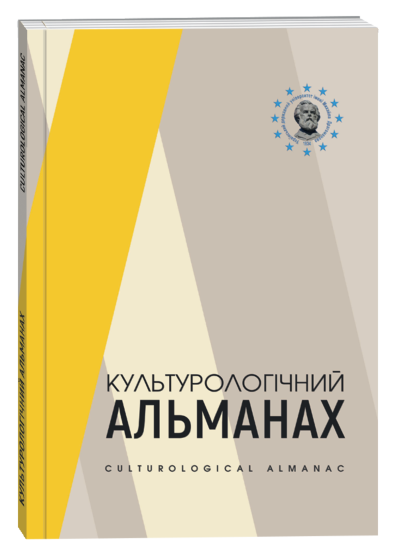COMPARATIVE ANALYSIS OF PHILOSOPHICAL POSTMODERNISM IN THE COUNTRIES OF CENTRAL AND WESTERN EUROPE IN THE 70S–80S OF THE 20TH CENTURY
DOI:
https://doi.org/10.31392/cult.alm.2023.2.34Keywords:
postmodernism, postmodernity, Italy, France, United Kingdom, Germany, deconstruction, simulacrum, intertextuality.Abstract
The topic of this article is the manifestations of postmodernism in European culture of the 20th century. The article pays special attention to the regional characteristics of the formation processes and thematic accents in the postmodernism of leading European countries. The methods of hermeneutics, comparative and contextual analysis are employed. Further research prospects are associated with a detailed analysis of the cultural integration and ideological diffusion of European postmodernism. The relevance of the topic lies in the search for new values and content that emerged as a result of the events of the Second World War and socio-cultural changes that took place in Europe during the specified period. The article aims to uncover the regional peculiarities of postmodernism in European culture of the 20th century, with the purpose of further investigating the cultural integration and ideological influence of postmodernism in Europe. Specifically, the article proposes to study the interrelationship between the regional characteristics of European postmodernism and its impact on the formation of cultural identities. The research reveals the uniqueness and variability of postmodern manifestations in different European countries, taking into account historical, sociocultural, and political conditions. This allows for a deeper understanding of the development of postmodernism as a phenomenon that influences the mentality, creativity, and lifestyle of contemporary European society. Further exploration of this topic will contribute to the discovery of new perspectives for analyzing postmodern manifestations in the context of European culture and enriching the scholarly discourse in this field. An additional objective of the article is to explore the influence of postmodernism on the contemporary cultural sphere of Europe. In the era of globalization and rapid development of information technologies, postmodernist ideas and aesthetics demonstrate their relevance and significance. They have found embodiment in various domains of life, such as art, literature, architecture, design, mass culture, and the internet space. Investigating the dissemination and impact of postmodernism on contemporary European culture allows for a better understanding of its dynamics and trends. The analysis of these processes paves the way for comprehending the importance and significance of postmodernism in the modern world, as well as predicting its further evolution in the future.
References
Васильєва, А.В. (2009). Національний характер німецького постмодернізму. Молодий учений, 10.
Джеймсон, Ф. (1996). Політика теорії: Ідеологічні погляди у постмодерністичних дебатах. У М. Зубрицької (Ред.), Слово. Знак. Дискурс: Антологія світової літературно-критичної думки ХХ ст. (с. 567–579). Львів.
Вінквіст, Ч., & Тейлор, У. (2003). Енциклопедія постмодернізму (В. Шoвкун, Пер., О. Шевченко, Навч. peд.). Київ: Вид-во Соломії Павловичка «Основи».
Ігнатенко, М. (1998). Ігрова культура постмодерну (або вже некультура). Вікно в світ, 2, 16-24.
Сенчук, І.А. (2011). Ірландський модернізм кінця ХІХ – першої половини ХХ століть: Вільям Батлер Єйтс і Джеймс Джойс: навч. посібник. Львів: ЛНУ імені Івана Франка.
Сосновська, Д. (1995). Кінець пафосу. Кінець вартостей? (На матеріалі новітньої української літератури). Сучасність, 6, 145–149.
Спанос, В. (1999). Сучасна теорія та відновлення забутого. Вікно в світ, 5, 112–121.
Старовойт, І. (1998). Future in the Past: метафорика історії у постмодерній прозі. У Т.4. Філологія (с. 30–33). Київ: Національний університет «Києво-Могилянська академія».
Татаркевич, В. (2001). Історія шести понять: Мистецтво. Прекрасне. Форма. Творчість. Відтворництво. Естет. переживання (В. Корнієнко, Пер.). Київ: Юніверс.
Підопігора, C.Я., & Підопікору, A.C. (2013). Філософський словник (Вид. 2-е, стp.). Постів н / Д: Фенікс.
Центральний, О.Ю. (№ 5). Культурно-світоглядні засади головного мережевого суспільства XXI ст. Людина і культура, 1–57.
Шахова, К.О., Жлуктенко, Н.Ю., Павличко, С.Д., & ін. (1993). Література Англії ХХ століття: Навчальний посібник. Київ.
British postmodernism. (Електронний ресурс). Отримано з http://dilka11.wixsite.com/bp001
Enciclopedie on-line. (Електронний сайт). Отримано з http://www.treccani.it/enciclopedia/postmoderno/
Ferroni, G. (1991). Storia della letteratura italiana, Т. 4. Einaudi Scuola.
Lucia Gasperini & Stefano Sandrelli. Calvino e il Sistema solare. (Електронний ресурс). Отримано з http://www.brera.inaf.it/utenti/stefano/occhiopianeti/carducci/postmoderno.htm
Ortheil, H.-J. (1987). Das Lesen-ein Spiel. Postmoderne Literatur? Die Literatur der Zukunft! Deutsche Literatur, Stuttgart, 592 c.








